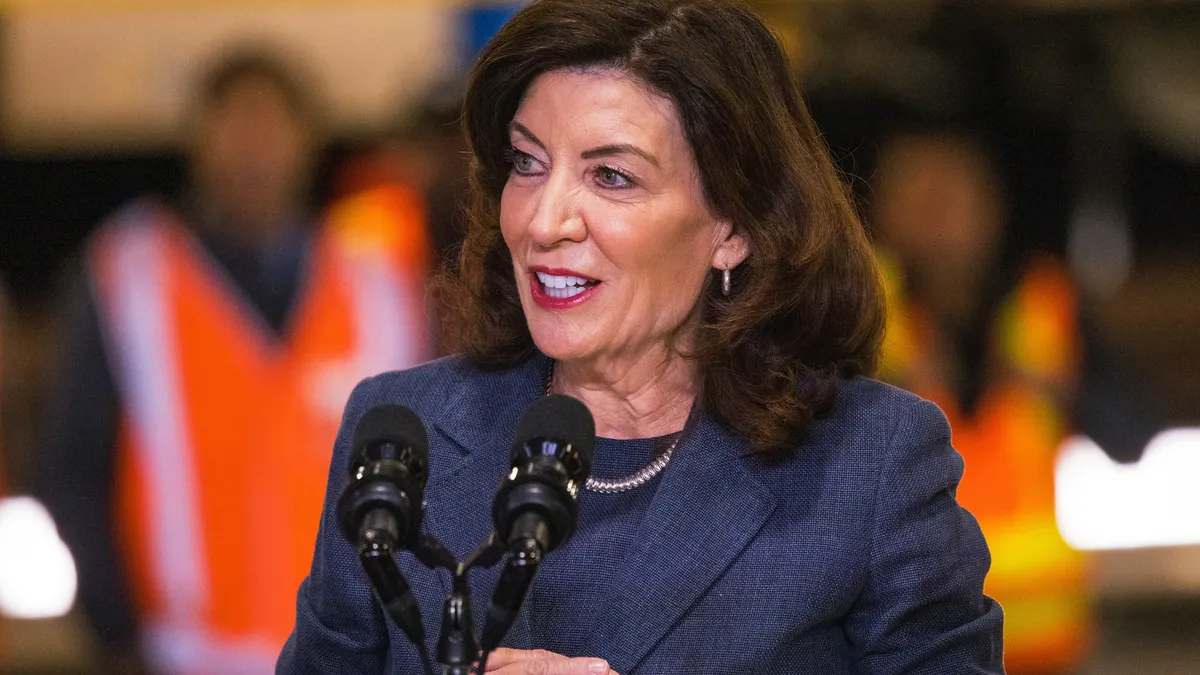Dive Brief:
- New York Gov. Kathy Hochul announced Tuesday she’s pursuing buy now, pay later-related legislation that would require BNPL providers to obtain a license to operate in the state.
- The bill would also permit the state’s financial services department to propose and issue regulations for the industry, according to a slate of proposals from the Democratic governor’s office. In New York, a governor can introduce legislation by way of the executive budget.
- The legislation and potential regulations aim to “establish strong industry protections around disclosure requirements, dispute resolution and credit reporting standards, late fee limits, consumer data privacy, and guidelines to curtail dark patterns and debt accumulation and overextension,” the governor’s office said in Tuesday’s new release.
Dive Insight:
The BNPL-related legislative proposal is part of Hochul’s agenda aimed at strengthening consumer protections. Current consumer law covers deceptive business practices, but New York is one of just eight states whose law doesn’t protect against unfair and abusive practices, the governor’s office noted in the release.
A spokesperson for Hochul’s office said specific legislative language will be unveiled as part of the governor’s executive budget presentation later this month.
As consumers increasingly tap BNPL loans for everyday and larger purchases, Hochul is directing the state’s department of financial services “to put stronger regulatory guardrails around the buy now, pay later loan industry,” she said during a speech Tuesday.
The governor’s announcement seems aligned with other government actions last month related to BNPL, including the Office of the Comptroller of the Currency’s guidance for banks related to BNPL lending, said Eamonn Moran, senior counsel at law firm Norton Rose Fulbright specializing in consumer financial services. The same is true of a letter from a group of Democratic senators to Consumer Financial Protection Bureau Director Rohit Chopra urging BNPL oversight, Moran said in an interview.
Where California already requires providers to obtain licenses to issue loans, New York appears to be taking a dual-pronged approach by focusing on licensing and regulation, said Moran, a former counsel at the CFPB’s Office of Regulations. Additionally, the BNPL-related concerns mentioned by Hochul’s office seem to mirror those the CFPB has mentioned in past reports, he said.
At the federal level, the specter of regulation has loomed over the BNPL industry since the CFPB launched an inquiry into the five biggest players — Affirm, Afterpay, Klarna, PayPal and Zip — in December 2021. The CFPB said in September 2022 that it was considering “interpretive guidance” or rules for the industry. Moran expects that guidance might land this year.
Max Levchin, the CEO of San Francisco-based Affirm, in November acknowledged oversight from the CFPB, saying supervision “levels the playing field” in the BNPL arena. Affirm already holds a number of licenses in states that require them from BNPL operators, including lending and money transmitter licenses, a company spokesperson told Payments Dive Wednesday.
The spokesperson reiterated that Affirm’s “top priority is empowering consumers by providing a safe, honest, and responsible way to pay over time with no late or hidden fees. This includes underwriting every transaction before extending credit, giving consumers control over their privacy choices, and providing consistent and transparent disclosures at checkout.”
A spokesperson for Sweden-based Klarna declined to comment. A spokesperson for Block-owned Afterpay didn’t immediately respond to a request for comment.











